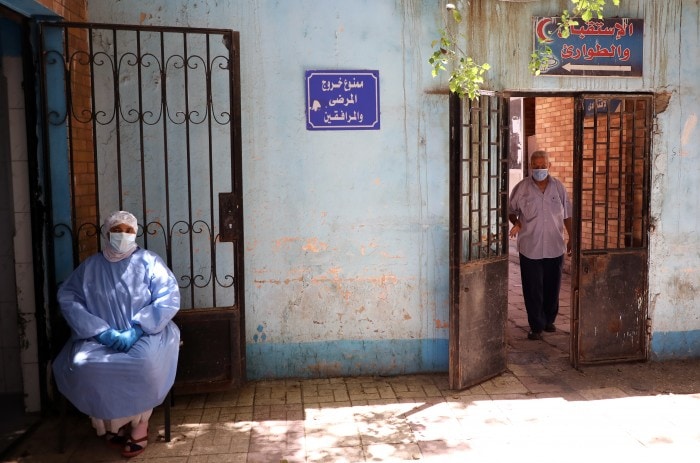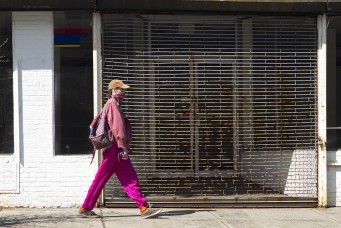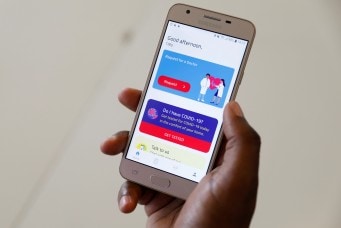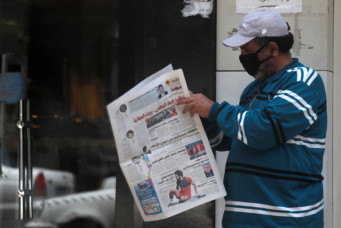Egypt’s Most Vulnerable and COVID-19
Are refugees and asylum seekers protected by its strong domestic laws and international commitments?

Medical personnel sit outside at the Imbaba Fevers Hospital in Cairo, Egypt, 28 April 2020. Khalid El-Fiqi/EPA-EFE
Youssef, a Sudanese refugee in Cairo, laments over the fact that he has just been laid off from his job at a cafe. His children, who previously attended public school, now do not have the means to attend the virtual classes being held as they have no access to a laptop or stable internet. He says he will defer their education as his priority now lies in giving them enough food and shelter. His friend Mubarak shares a photo showing a woman attempting to hide her face through visible tears—her few belongings strewn on a dirt road. She has been evicted for not paying rent, recently having lost her source of livelihood.
For Egypt’s refugee community, numbering 256,632 officially registered asylum-seekers and refugees, COVID-19 has been particularly difficult. Not eligible for government cash assistance and without financial support from non-profit organizations, many refugees now find themselves unemployed and unable to receive any help. This is in addition to the fact that sixty percent already live below the poverty line.
While much of media coverage has been focused on issues refugees in camps face due to COVID-19, barely any attention has been given to those who live in large urban cities, often crammed together in informal settlements. Egypt does not have any camps, rather allowing its refugee population to live in its urban areas. Cairo’s refugees are not fully integrated with the host community either economically or socially, and often live in their respective tight-knit communities in less economically well-off, and often informal, neighborhoods. This not only puts their close-knit communities in danger from contracting the virus but jeopardizes Egypt’s overall response to COVID-19, which aims to enforce measures of social distancing.
A recent year-and-a-half-long study I conducted along with two other legal experts for the Center for Migration and Refugee Studies at the American University in Cairo showcases the importance of Egypt’s legal frameworks on employment and healthcare and also the implications if practice does not meet theory. Can they be enough to make sure its refugee population does not fall through the cracks of the country’s COVID-19 response?
Unlike its regional neighbors in the Levant and the Gulf, Egypt is signatory to the 1951 Convention Relating to the Status of Refugees and its subsequent 1967 protocol. In fact, according to our research, Egypt has many different legal frameworks which can be beneficial to refugees in light of COVID-19, and therefore, be valuable to Egypt as a whole as it answers to the worldwide pandemic. Now, more than ever, Egypt needs to address the gaps between its legal entitlements and on-the-ground experience. If done properly, Egypt can be on the forefront for including a “whole of society” approach to its response.
The 1951 Refugee Convention states that refugees are entitled to be treated on par with nationals of a foreign country when it comes to employment. In addition, any employment restrictions imposed on foreigners should no longer be applied to a refugee after he/she has resided in the host country for three years, or has a spouse or children holding the nationality of the country of residence. In Egypt’s domestic framework, the right to work for non-citizens is highly regulated and has many restrictions such as an expensive work permit, which is to be renewed yearly, and a requirement that all workplaces not allow more than a 10 percent foreign workforce. With regards to self-employment, refugees seeking to open a business need to submit the necessary paperwork along with a business plan to the Ministry of Investment and pass a security clearance.
As these requirements are incredibly difficult to fulfill, many refugees resort to working in the informal labor market, without any permits or contracts, or rely on financial support from NGOs or family members, which is often scarce. That said, our findings have shown that many refugees in the informal sector have already lost their jobs or have not been financially compensated for work that was completed before measures to fight the pandemic were put in place. Others were affected by measures that resulted in the closure of many cafes, restaurants, and coffee shops.
Mubarak said that many in his community have lost their jobs as domestic workers and cleaners in Egyptian households, particularly single mothers. He worries about where these evicted families will go. While some may move in with other members of the community, having crowded apartments may pose a risk to the health and well-being of these households.
Refugees are also entitled to proper healthcare: through cooperation between the Ministry of Health and Population and United Nations High Commissioner for Refugees, refugees have access to public primary, secondary, and emergency health services, same as nationals. The Ministry of Health has set up a hotline for questions regarding COVID-19 and requests for medical assistance throughout Egypt, which can be used by anyone.
However, reality on the ground could be much different. Mohamed, a member of the Somali community, said that he would rather stay at home and self-isolate than attempt to be treated at a public hospital, where he has been turned away before due to his nationality. Another Sudanese community member believes that due to the overcrowding and lack of resources in the hospitals, refugees who do try and access the hospitals will also be turned away for lack of beds. As no biographical information has been reported, it is difficult to know what the effects the spread of COVID-19 has had in the refugee communities, but sources from the refugee community have confirmed cases, and at least one death, all occurring in an informal settlement. The Egyptian legal framework with regards to access to health services is strong and on the side of vulnerable populations if the lack of resources can be overcome.
Egypt has in its pocket many legal tools that it can use to include refugees in its COVID-19 action plan for the greater public health and employment. What remains to be seen is if the law will be enough to help the most vulnerable during these times of great unpredictability.
All names have been changed due to confidentiality.
Elena Habersky is the current Project Manager of the “Refugee Entitlements in Egypt Project” at the Center for Migration and Refugee Studies at the American University in Cairo. She holds an MA in Migration and Refugee Studies from AUC and has spent the past seven years working in the MENA region with urban refugee populations. On Twitter: @bur_ski
Read More



